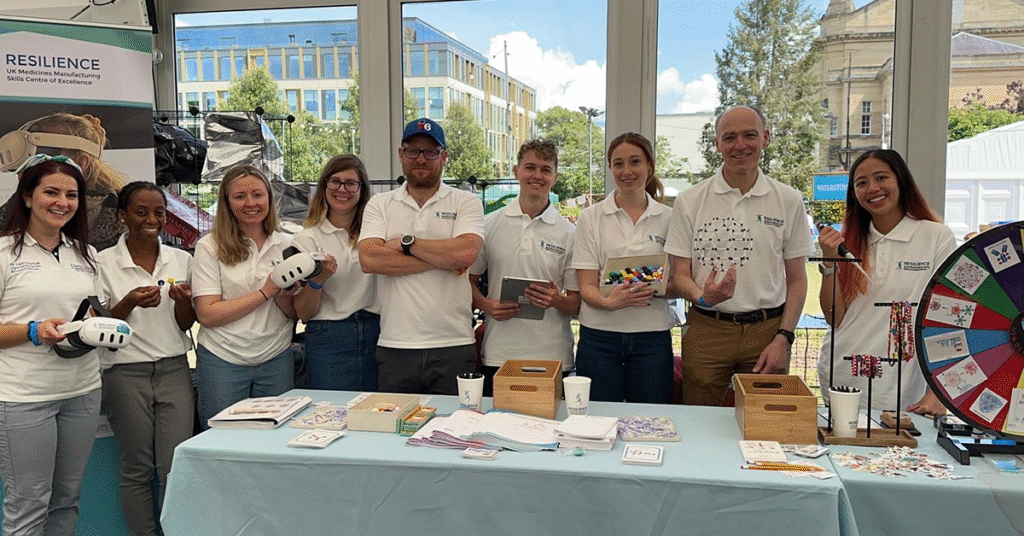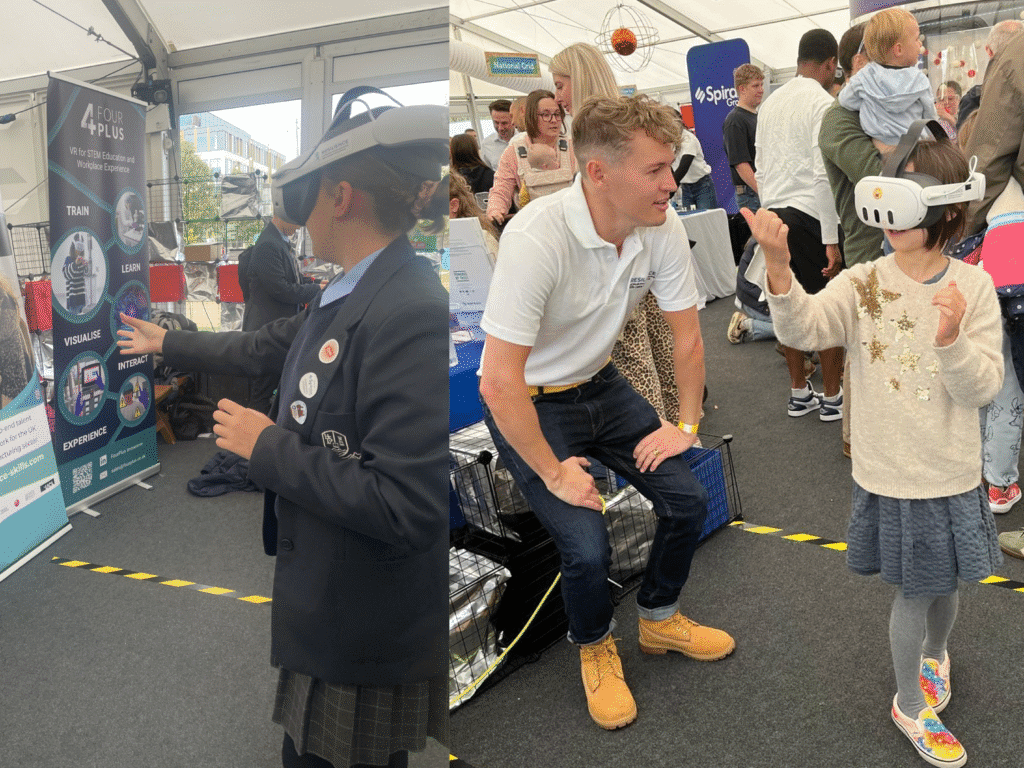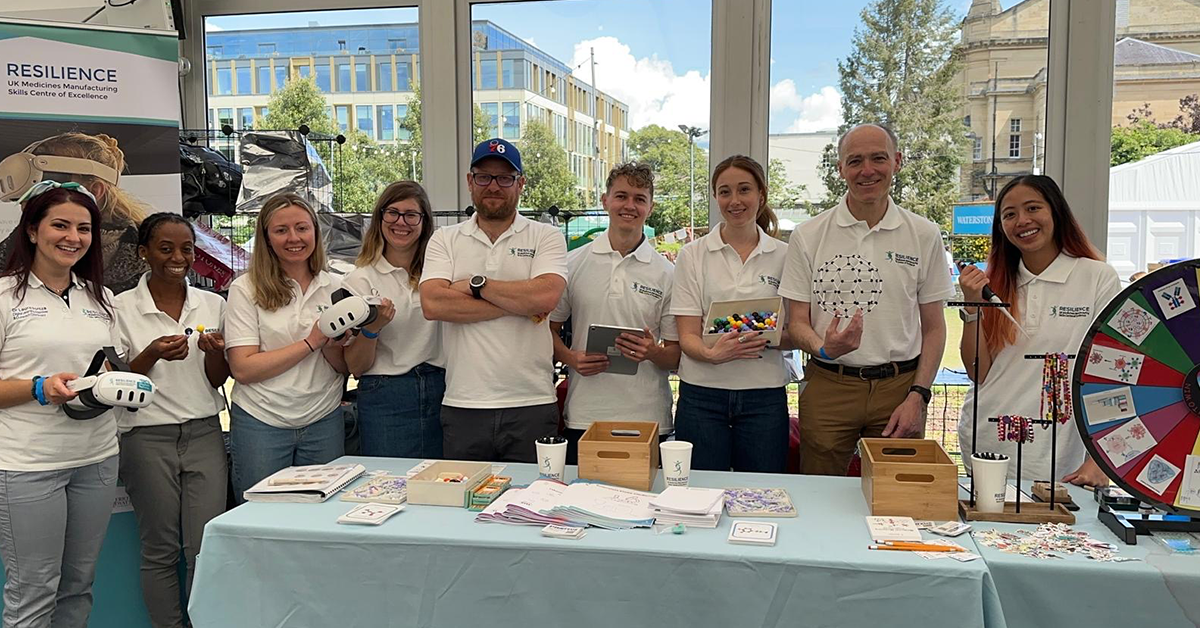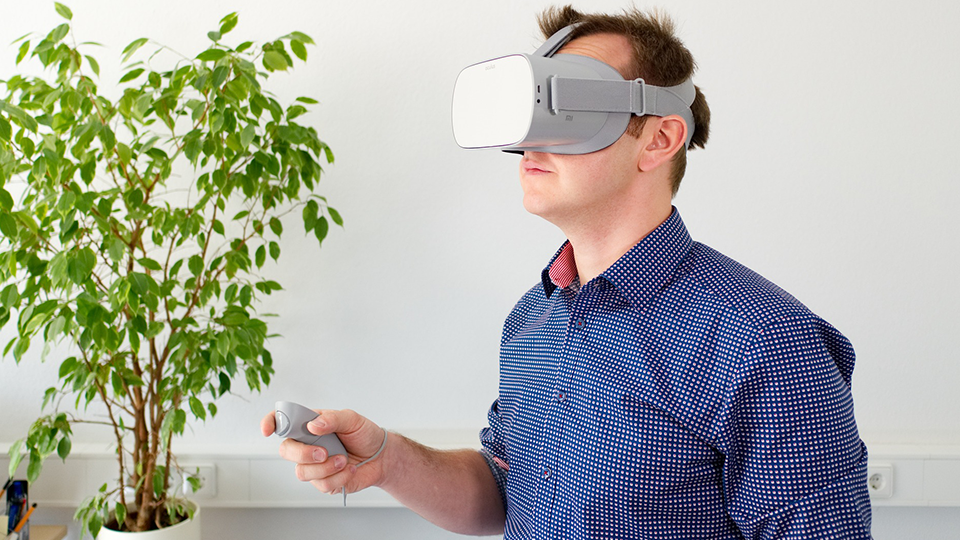Beyond Screens: VR and Gamification Transform learning Experiences
Inspired by our trip to Cheltenham Science Festival (UK), here is an evidenced based analysis of how digital technology (including desktop based learning and Extended Reality) impact confidence, engagement and retention.
Key Takeaways:
The Cheltenham Science Festival provided a valuable opportunity to observe how enriching Virtual Reality can be for learners of all ages.
We saw firsthand how quickly children became absorbed in the VR environment—grasping new scientific concepts and techniques with ease.
According to research, Extended Reality can benefit when learning abstract or complex content.
Integration of forms of digital technologies in education can lead to more enjoyment and would foster a more holistic approach to learning.
Learning with Virtual Reality at Cheltenham Science Fesival
This month, FourPlus had the pleasure of attending the Cheltenham Science Festival—an event renowned not only for its famous faces but also for bringing the community together through a week of science-inspired activities.
We were based in the Discover Zone, collaborating with RESILIENCE to promote learning with Virtual Reality (VR) and Mixed Reality (MR) technologies to children, their families and teachers, casting on the big screen to draw curious onlookers. The new MR lab experience captivated attendees with the potential of its unrestricted laboratory environment. Additionally, the ever popular virtual cell experience continued to spark amazement.
While the technology was impressive, the true aim of the event was to engage and inform the educators and families. The festival offers a unique opportunity, allowing attendees to explore a range of STEM career based activities. It’s rare for children to have access to tools that support visual and kinaesthetic learning inside the classroom. These technologies are proving essential for boosting learners’ confidence, engagement, and retention—hopefully paving the way for their broader integration into everyday education.

Elevating students educational experience
Following the festival, we explored research examining the real-world impact of digital learning tools, including desktop-based learning and XR software.
One study by Makransky, Terkildsen and Mayer (2019) compared an identical science simulation delivered via immersive VR and desktop. Interestingly, the study illustrated that learners in the VR condition showed lower retention and knowledge transfer (d = 0.80). However, participants reported significantly higher enjoyment and presence in the VR condition (d = 1.30), suggesting that the immersive environment may introduce cognitive overload thus distracting from key learning points. This aligns with earlier research by Van der Heijden (2004). They also noted that high enjoyment and environmental engagement can sometimes detract from educational material. Meyer, Omdahl and Makransky (2019) reinforced a consistent finding that higher enjoyment ratings are often perceived for VR (M = 4.20, SD = 0.79) compared to desktop video instruction (M = 3.77, SD = 0.91).
This research highlights the importance of thoughtfully implementing immersive tools in lower key stage teaching to prevent cognitive overload. Nevertheless, it is clear that students find virtual reality more engaging, stimulating and memorable.
As educational and societal needs and demands have changed, traditional learning needs to be reinforced and transformed through the use of new technological applications and approaches to adapt and meet the new requirements. The use of gamification and virtual reality in educational contexts is becoming more popular as a means to satisfy students’ pursuit for more interactive, immersive, engaging, and meaningful learning.
Lampropoulos 2024

VR benefits complex skills training
Further insights came from a systematic literature review by Hamilton et al. (2020) comparing studies which assessed the effective of immersive VR against desktop learning in different educational disciplines. They found that immersive VR offered clear benefits in training on complex, abstract or procedural content. This included engineers assembling devices (Bharathi & Tucker, 2015) or medical students practicing knot tying (Yoganathan et al., 2018). These benefits were attributed to the increased physical interaction and spatial freedom offered by VR. However, the review also highlighted that many studies found no significant advantage of immersive VR over engaging desktop learning in regards to knowledge transfer and retention (Hamilton et al., 2021).
PC vs VR in education - the verdict
Conclusion – The correct implementation of VR and gamification can maximise the learning potential.
In summary, while immersive technologies can greatly enhance engagement and provide unique educational experiences, their effectiveness depends on thoughtful implementation and an understanding of cognitive load. Events like the Cheltenham Science Festival give us the chance to explore these tools with real-world audiences, sparking conversations and ideas about the future of learning.
The excitement on every face reminded us of one simple truth: when we move beyond books, learning transforms—becoming unforgettable. VR and gamification aren’t just innovations; they’re the gateway to a new era of education.
Resources:
- Makransky, G., Terkildsen, T. S., & Mayer, R. E. (2019). Adding immersive virtual reality to a science lab simulation causes more presence but less learning. Learning and Instruction. https://doi.org/10.1016/j.learninstruc.2017.12.007.
- Meyer, O., Omdahl, M. and Makransky, G. (2019). Investigating the effect of pre-training when learning through immersive virtual reality and video: A media and methods experiment. Computers and Education. https://doi.org/10.1016/j.compedu.2019.103603
- Hamilton, D., McKechnie, J., Edgerton, E. et al. (2021). Immersive virtual reality as a pedagogical tool in education: a systematic literature review of quantitative learning outcomes and experimental design. https://doi.org/10.1007/s40692-020-00169-2
- Lampropoulos, G., & Kinshuk. (2024). Virtual reality and gamification in education: a systematic review. Educational Technology Research and Development. https://doi.org/10.1007/s11423-024-10351-3





